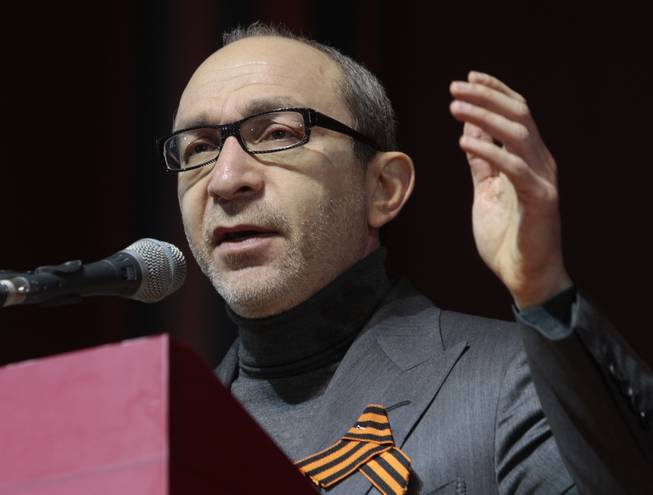
Sergei Chuzavkov / AP
In this Feb. 22. 2014, file photo, Kharkiv mayor Hennady Kernes speaks at the congress of provincial lawmakers and officials in the Ukrainian eastern city of Kharkiv. Kernes was shot in the back Monday morning, April 28, 2014, his office said.
Monday, April 28, 2014 | 8:01 a.m.
KIEV, Ukraine — The mayor of Ukraine's second-largest city was shot in the back and pro-Russia insurgents seized more government buildings Monday as the U.S hit Russia with more sanctions for allegedly fomenting the unrest in eastern Ukraine.
Armed insurgents tacitly backed by Moscow are seeking more autonomy in the region — possibly even independence or annexation with Russia. Ukraine's acting government and the West have accused Russia of orchestrating the unrest, which they fear Moscow could use as a pretext for an invasion.
In a bid to ratchet up the pressure on Russian President Vladimir Putin, President Barack Obama's government levied new sanctions on seven Russian officials and 17 companies with links to Putin's inner circle. The U.S. also revoked licenses for some high-tech items that could be used by the Russian military.
In Brussels, the European Union moved Monday to add 15 more officials to its Russian sanctions list to protest Moscow's meddling in Ukraine. That decision, reached by the ambassadors to the EU's 28 nations, was being formally confirmed by the EU's governments and was expected within hours, officials told The Associated Press.
Hennady Kernes, the mayor of Kharkiv, was shot in the back Monday morning while cycling on the outskirts of the city and underwent surgery, city hall said. He was reported to be in "grave, but stable" condition.
Officials have not commented on who could be behind the attack — and Kernes was a man who could have angered both sides.
Kernes was a staunch opponent of the pro-West Maidan movement that toppled President Viktor Yanukovych in February and was widely viewed as the organizer who sent activists to Kiev from eastern Ukraine to harass those demonstrators.
But he has since softened his stance toward the new Kiev government. At a meeting of eastern Ukrainian leaders and acting Prime Minister Arseniy Yatsenyuk earlier this month, Kernes insisted he does not support the pro-Russia insurgents and backed a united Ukraine.
Kharkiv is in eastern Ukraine, where pro-Russia gunmen have seized government buildings and police stations, set up roadblocks and staged protests to demand greater autonomy or even annexation by Russia. But unlike the neighboring Donetsk region, Kharkiv has been largely unaffected by the insurgency and Kernes has been credited for this. Its administration building was briefly seized earlier this month but promptly cleared of pro-Russia protesters.
Kernes' friend and former Kharkiv governor, Mykhailo Dobkin, told journalists the attackers were aiming at Kernes' heart and wanted to kill him in an effort to destabilize the city.
"If you want to know my opinion, they were shooting not at Kernes, but at Kharkiv," he said.
Dobkin is among several candidates running in Ukraine's May 25 presidential election.
On Monday, masked militants with automatic weapons seized another city hall building and a police station in eastern Ukraine, this time in Kostyantynivka, 160 kilometers (100 miles) from the Russian border. The city is 35 kilometers (22 miles) south of Slovyansk, a major city that has been in the hands of insurgents for more than three weeks.
After the seizure, about 15 armed men guarded the city hall building. Some posed for pictures with residents while others distributed St. George's ribbons, the symbol of the pro-Russia movement.
Many in the east have suggested a referendum on autonomy or turning Ukraine into a loose federation. Justice Minister Petro Petrenko said parliament will consider the issue Tuesday, the Interfax news agency reported.
Russia on Monday turned down Kiev's request to visit the military exercises that Moscow is doing along the border. Russia's foreign ministry said the Geneva deal that Ukraine and Russia signed earlier this month does not restrict what the Russian army can do on its own territory.
NATO says Russia has up to 40,000 troops stationed in regions along the border, a development that threatens Ukraine.
The increasingly ruthless pro-Russia insurgency, meanwhile, is turning to an ominous new tactic: kidnapping. About 40 people are being held hostage in makeshift jails in Slovyansk — including journalists, pro-Ukraine activists and seven military observers from the Organization of Security and Cooperation in Europe, Ukraine's Security Service said Monday.
The German government called Monday for the immediate release of the European military observers, who were detained Friday on allegations they were spying for NATO.
Pro-Russia militants in camouflage and black balaclavas paraded some of the captive military observers before the media on Sunday. They also showed three Ukrainian security guards bloodied, blindfolded and with their arms bound with packing tape.
Nataliya Vasilyeva in Moscow, Sergei Grits in Kostyantynivka, Ukraine, and Julie Pace in Manila, Philippines, contributed to this report.

Join the Discussion:
Check this out for a full explanation of our conversion to the LiveFyre commenting system and instructions on how to sign up for an account.
Full comments policy